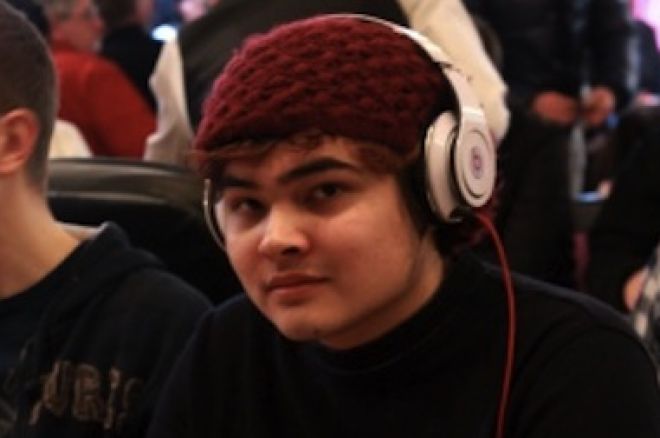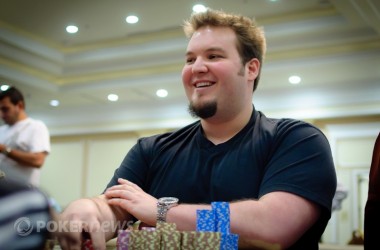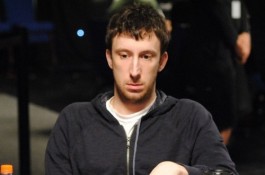Alex Wice Discusses a Hand Versus Lee Watkinson

Alex Wice is not only an accomplished cash-game grinder, but he��s also had considerable success in tournaments. He��s earned more than $1.2 million in online cashes and nearly $600,000 at live events including a third-place finish at EPT Deuville for nearly $450,000. He talked to PokerNews about a hand he played on Day 1 of the NAPT Mohegan Sun against Lee Watkinson.
Blinds: 150/300 with a 25 ante
Preflop Action: Wice raised from the middle position with 10?10? to 900. Lee Watkinson called from the small blind.
He��s reasonably tight. I see him as a standard, tight but smart-thinking player.
What kind of range did you put him on for flatting out-of-position?
With antes, he would flat raises with a bunch of suited hands now, but given positions, he would be fairly pocket-pair heavy. I would imagine he would call with pocket twos through jacks, ace-queen, and rarely ace-jack. Also he has suited cards, something like seven-six, through king-queen, some decent suited aces like ace-ten or ace-jack, king-jack. He might sometimes flat pocket queens, and probably often flats ace-king. It��s possible he��d also flat with a bunch more suited hands like eight-six.
Is three times the big blind your standard raise size in tournaments?
Yes, and in general, I like to play the beginning of a tournament more like a cash game. Anytime everyone is playing 100 big blind stacks, I like to make it three times the blind because I am more comfortable with that size.
Flop Action: The flop came down 7?6?4?. Watkinson and Wice both checked.
A check on a board like seven-six-four rainbow is actually somewhat standard as you play mid-stakes cash games online because it is a very check-raisable board. It is hard to get more than two streets of value from a worse hand versus a competent player. Also, with positions, versus a reasonably tight player, their range is very pocket-pair heavy. Now, the monotone board complicates things because in general, with a flop with all clubs, we should c-bet [continuation] because it is harder to bluff monotone boards out of position. And value-betting thinner is also important because he has more equity overall, making protection more important. However in these positions, it��s not as important as one thinks because the amount of off-suit hands he has in his range is very small. If he isn��t suited, it's either a pocket pair or ace-queen or ace-king. He��s probably not flatting out-of-position with a hand like king-queen offsuit. So basically, my 10? is more reasonable than one would think.
It��s important to mention how pocket-pair heavy his range was from the hands I listed. With pocket twos through jacks, ace-queen or mostly ace-king, and some suited connectors, he has like 10 flushes, 30 connectors that didn��t make flushes, 46 pockets (some of which have a club and some of which are a set), and about 25 overcard combos that aren't a flush. I'm definitely ahead enough that betting is good too, but I think my hand plays better as a check. As a default versus reasonable opponents with very pocket-pair heavy ranges, about half the time I will check back all the mid-low boards fairly wide, including with some great hands like pocket kings on a five-six-eight rainbow board.
Were you concerned about not protecting your equity at all?
Protection is important, but his range was strong enough that being bluffed off my hand was a very real possibility. On this seven-six-four board, he can check raise with flushes, pocket threes through eights, or his big cards with a club as a bluff. That��s a lot of combos that can check-raise me, and my hand plays very badly to a check-raise.
Turn Action: The turn was the 10?. Watkinson bet 1,500, and Wice raised to 4,400. Watkinson called.
It was really important to inflate the pot in case he had a big hand. Also I could protect a bit versus a big club, or gutters [inside-straight draws]. Some people may see my raise as dangerous. A lot of people just don��t have raising as part of their game, so it makes sense that they don��t raise without basically the nuts for value in their mind because implicitly they don��t want to inadvertently turn their raise into a bluff. Although here, I don��t think my raise was thin at all.
When he bet, I thought that he had at least gutter or a club. It is not that often that he would do this as a pure move with no equity. He probably figured I wouldn��t check back the flop with no equity very often, so I must have some sort of equity, but that��s not true. Checking back middle-low flops is part of my overall game, so because I'm protected I would make a delayed continuation bet with some hands without a pair here. So, if he thinks I have some equity, then the kind of hands he would have led the turn with besides a set or flush are ace-queen or ace-king offsuit with a big club or even without a club sometimes, nine-eight, sometimes ten-nine, eight-seven, pocket eights, pocket nines, pocket fives, pocket threes. The last ones are important. That��s 24 combos of gutters or straight draws. For a guy that only has 100 combos or so preflop, that��s a lot of gutters.
Now in my head, I��m thinking, he��s just so likely to have a pair, and just based on his reaction of my raise, I felt like he had a set. He felt that I was representing a slow-played flush or air. Most people feel that other players play the way they play. Since he would only have a flush or nothing in my spot, he figured that was what I had. At this point, I was feeling decent about my hand, even though it is likely with a low flush he would bet/call the turn, and there isn't that much else besides a flush or set he would bet-call the turn with.
Finally, on the turn, my raise is also protected because it is still fairly deep. If he repops [reraises] it, he won��t go huge. He would just make it like 10,500, so my hand plays well even if I��m reraised. I would not lose that much extra versus a flush if I repop it because I could value bet the river well and if he had a lower set, the pot was big enough so that I could stack his boat on the river.
River Action: The river was the 8?. Watkinson checked, and Wice bet 8,000.
To be honest, I just felt like he had a set or seven-six, or possibly eight-seven and didn��t believe me. In general, you should always try to go for thin value. That way, you can bluff more often while still playing technically accurate. If you wrote his range on paper, and you had him call game theory optimal, tens is probably a losing bet. But I really felt like he had a set.
If he had made a gutter on the river, would he be more likely to lead?
I'm not sure, but I doubt it. I mean my bet on the river is probably really thin versus him. He may be check calling king-queen of clubs and not have much else besides a flush or set on the river. My bet was more read-based. I thought I had the best hand even though he has a flush a significant amount of the time.
He tanked for a long time. At that point, I got a touch worried. Finally he folded and told me he had pocket sevens. I think I made a good bet, and if he didn��t know me he made a reasonable fold. He said out loud he thought I had a big flush or nothing. Of course, if he is at that point in his thought process, it is an easy fold for him, since he just thought I would not bluff the river often enough, as he probably knows most players are too weak on the river.
Looking back, do you still like your river bet?
Well, versus a really tight player, I might decide to check the river. I mean, if he folded pocket sevens, my bet is a "bad bet" in practice but in theory is good. Also he might have gotten curious. It��s also probably good for my overall game, since I really like to try to bluff as much as possible in all spots that still keeps my opponent losing or breaking even if they want to try to catch a bluff. Overall, I like my bet. I always try to let heroes be heroes.
Remember, follow us on Twitter for up-to-the-minute news.








